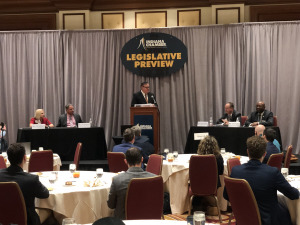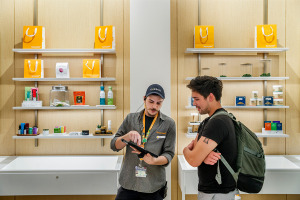
Indiana officials projecting big jump in budget surplus
The State Budget Committee on Thursday projected booming growth in Indiana’s budget surplus, setting up a debate during the upcoming legislative session over possible tax cuts.

The State Budget Committee on Thursday projected booming growth in Indiana’s budget surplus, setting up a debate during the upcoming legislative session over possible tax cuts.

House Republican leaders want to reduce the personal property taxes businesses pay on equipment, claiming it is one of the last tax obstacles in recruiting new businesses and spurring growth for businesses already here.

For the past year, Indiana employers have faced the challenge of whether to enforce COVID-19 vaccination mandates on workers who say the vaccines violate their religious beliefs.
Many conservatives have criticized Republican Gov. Eric Holcomb for continuing to extend the monthly public health order, which he has renewed 20 times, although he has signaled he might not to do so again.

Business tax cuts and nixing government-imposed vaccine mandates will be among the legislative priorities for Indiana Chamber of Commerce next year, and top GOP lawmakers mostly appear to be on the same page.

Despite the state’s long-standing refusal to legalize marijuana, the Delta-8 THC derivative is being sold thanks to a legal gray area that many state officials would rather not talk about.
Mike Leppert, a former lobbyist, has written a novel, “Flipping the Circle,” that tells a fictionalized version of efforts at the Indiana General Assembly to create a monopoly for e-liquid vaping products.
House Ways and Means Chairman Tim Brown wants to explore expanding Indiana’s 7% sales tax to services, which potentially could be anything from haircuts to hospital stays, with the aim of lowering the overall sales tax rate.

Eyes will once again be on Indiana to see if lawmakers will loosen the state’s marijuana laws as neighboring states continue to cash in on legal weed.

Freshman Rep. John Jacob, himself a Republican, says Republican leaders “butchered” his legislative district and redrew it in a way that is designed to deny him re-election.
Democrat Rep. Justin Moed and former Democratic Senate candidate Ashley Eason have both publicly announced interest in running for the Indiana Senate in a new downtown Indianapolis district.
The Crawfordsville Republican spent the past eight legislative sessions as chairman of the House Ways and Means Committee and suggests he will propose a tax cut for Hoosiers as he departs the legislature in 2022.
Violations will now result in four points against a driver’s license, BMV officials said.
In Indiana and other states, anger at perceived overreach by health officials has prompted legislative attempts to limit their authority, including new state laws that prevent the closure of businesses or allow lawmakers to rescind mask mandates.
The usual gerrymandering is expected this year as the Legislature embarks on the once-a-decade process of redistricting, though public scrutiny is expected to be much greater than in previous years.
Indiana Attorney General Todd Rokita’s office got its day in court Wednesday to argue why it thinks Gov. Eric Holcomb shouldn’t have been allowed to hire his own attorneys to sue the Indiana General Assembly. A ruling isn’t expected for at least several weeks.
Republican lawmakers asked the governor to issue an executive order prohibiting any state university from mandating vaccines that don’t have full U.S. Food and Drug Administration approval.
As part of his battle with the Legislature over executive powers, Indiana Gov. Eric Holcomb is accusing Attorney General Todd Rokita of creating a legal fiction in order to expand the attorney general’s “authority beyond his statutory duties and powers.”
The Democratic-majority council’s vote—which passed 19-5 along party lines—keeps a citywide mask mandate and restaurant capacity limits in place in Indianapolis.
Gov. Eric Holcomb’s veto marks another pushback against fellow Republicans’ legislative efforts to weaken the powers of the governor or others during emergencies such as the pandemic.